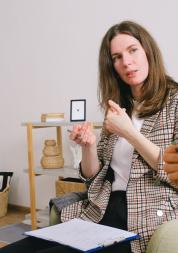Healthwatch Wandsworth report on findings of Female Genital Mutilation (FGM) awareness survey
Background
All regulated healthcare, social care professionals and teachers will be obligated to report those at risk and confirmed cases to the police.
There are many different reasons why FGM occurs and these relate mainly to pressures on families to conform to the social demands of culture.
It is estimated that approximately 103,000 women aged 15-49 and approximately 24,000 women aged 50 and over and 10,000 girls who have migrated to England and Wales, have undergone FGM.
Therefore, funding was provided to recruit and train twelve Community Health Champions whose role was to raise awareness of the legal, health and clinical implications of FGM and run workshops in schools, mosques, churches and community centres.
What we did
Healthwatch Wandsworth was invited to participate in the programme and their Information and and Signposting Officer was subsequently trained to be a Community Health Champion.
As a result we took this opportunity to engage with a part of the population in Wandsworth who are very hard to reach.
Over four outreach sessions, we surveyed and spoke to members of the public, tutors and students to gauge their levels of awareness of FGM and the services available to those at risk or recovering from FGM.
The "Healthwatch Wandsworth FGM Awareness Survey" questions were designed to assess the level of knowledge of FGM such as:
- Whether they had heard of FGM?
- Did they know someone or heard of someone who had undergone FGM?
- Were they aware of the existence of community based services in London that tackle the health and social issues associated with FGM?
- Would they know what to do in the event that someone they knew was affected by FGM?
- Did they think enough was being done in Wandsworth to raise awareness of FGM and why it is a practice that should be stopped?
What We Found
The discussions held with the students and tutors provided a useful insight into their needs with regards to learning more about FGM.
The main outcomes were:
- Students wanted to learn more about FGM.
- A lack of knowledge from students on FGM as it usually is difficult to talk about.
- Tutors wanted advice on how to talk to their classes openly about FGM without making different cultures feel uncomfortable.
- Tutors expressed a wish for external people to talk to their students about FGM, such as Community Health Champions who are often from the practicing communities.
Conclusions and Recommendations
FGM continues to occur despite the practice being illegal and harmful to children and women. There is an awareness that FGM occurs but it is generally associated with a lack of knowledge about the law against it and what can be done if a women or child is in danger of having FGM done to her.
This highlights a need to continue to prioritise raising awareness so all people in all communities are reached as well.
There is currently some proactive work being done to enable health and social care professionals in hospitals and in the community to identify those at risk, or those that have undergone FGM but more needs to be done such as:
- An awareness raising campaign e.g. posters placed in GP surgeries and other areas of health and social care provision.
- Other sessions could be held as this is a successful way of addressing communities and giving them the opportunity to talk about subjects they usually cannot address.
- External professionals, like the Community Health Champions or other health, social, safeguarding professionals to talk to students about FGM.
- A need for a proactive programme that encourages open discussion and knowledge sharing without prejudice or judgement from other.
If you need this report in a different format, please e mail
enquiries@healthwatchwandsworth.co.uk or call 020 8516 7767

